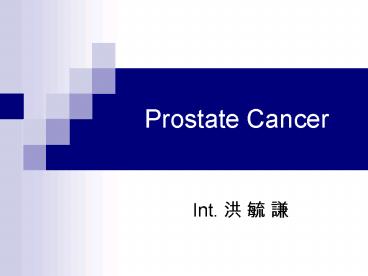Prostate Cancer - PowerPoint PPT Presentation
1 / 16
Title:
Prostate Cancer
Description:
Prostate Cancer Int. Prostate cancer is the Second leading cause of death from cancer in the United States American male, the lifetime risk of: 1. – PowerPoint PPT presentation
Number of Views:1098
Avg rating:3.0/5.0
Title: Prostate Cancer
1
Prostate Cancer
- Int. ? ? ?
2
- Prostate cancer is the Second leading cause of
death from cancer in the United States - American male, the lifetime risk of1.
Developing prostate cancer is 172. Dying of
prostate cancer is only 3 - Autopsy - small prostatic carcinomas64 of 60
to 70 years of age - Screening1. Digital rectal examination2. PSA
level(lt 4.0 ng/Ml) if abnormal ?Transrectal
ultrasonography to guide Prostate biopsy
3
(No Transcript)
4
(No Transcript)
5
Prostate cancer screening has been a
controversial issue because the effectiveness of
screening remains uncertain. No studies have yet
proven a survival benefit with screening
6
Gleason Score? assigns a grade to each of the
two largest areas of cancer in the tissue
samples. ? The two grades are then added
together to produce a Gleason score 2 to 4
low grade 5 to 7 intermediate grade8 to 10
high grade
7
Early prostate cancer Treatment
- Radical Prostatectomy
- Radiation therapyExternal beamBrachytherapy -
can be considered a standard therapeutic option
for men with low-risk disease - Watchful waiting
- Hormone therapy
8
RADIATION THERAPY (External Beam)
- Does not require hospitalization and normal
activity can usually be maintained during the
course of therapy. - Cure rates appear to be comparable with Radical
Prostatectomy(RP), at least for the first five to
eight years - Late recurrences can occur. As a result, ten
years or more after treatment, the outcome with
RT may not be as favorable as with RP. However,
the available data on this issue using modern
radiotherapy techniques are limited.
9
Brachytherapy
- Permanent seeds implantation requires only a
one-time insertion in an outpatient setting.
Radiation exposure to physicians, nursing
personnel, and family members is negligible.
10
Brachytherapy
- High dose rate (HDR) temporary brachytherapy A
computer-controlled machine pushes a single
highly radioactive iridium seed into the
catheters one by one. Because the computer can
control how long this single seed remains in each
of the catheters, we are able to control the
radiation dose in different regions of the
prostate.
11
Watchful waiting or Radical Prostatectomy ??
Death from Prostate Cancer
12
Watchful waiting or Radical Prostatectomy ??
Distant Metastasis
13
Watchful waiting or Radical Prostatectomy
Cumulative Probability of Death
14
Watchful waiting or Radical Prostatectomy
- A statistically significant difference in the
risk of death due to prostate cancer after
radical prostatectomy as compared with watchful
waiting, yet there was no significant difference
between the two groups in the overall survival
rate. - Life quality
15
Hormone therapy
- In randomized trials (N Engl J Med 1997 Jul
31337(5)295-300 ) in men with locally advanced
prostate cancer Neoadjuvant hormone therapy
(androgen deprivation therapy) significantly
improves disease-free survival, time to the
development of progressive disease and overall
survival
16
Advanced prostate cancer Treatment
- Second-line hormone therapy
- Chemotherapy 1. In early trials, objective
response rates were 10 to 20 percent, and
median survival did not exceed 12 months. 2.
Newer regimens, particularly those that include
docetaxel, a significant prolongation in
median survival, approaching 20 months. - Sr 89can release 60 80 symptoms of bone
metastasis - Re186-HEDPAggregate in sites of bone metastasis,
release 80 of pain

